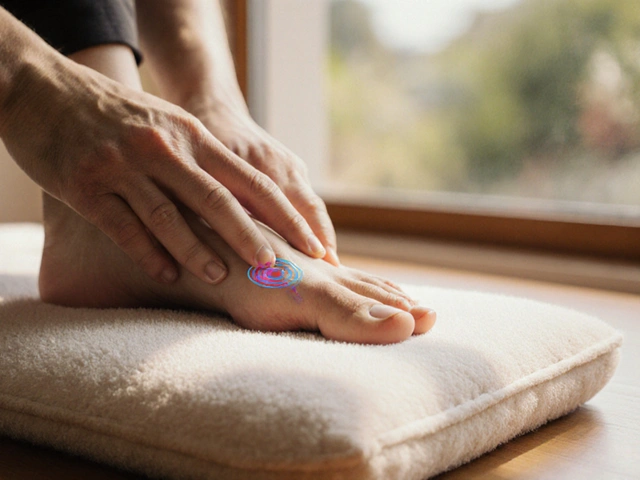Wellness: Practical Health Tips for You and Your Dog
Your stress affects the whole household, including your dog. Small, consistent changes make the biggest difference. This page pulls together simple, proven habits you can start today to boost physical and mental wellbeing for both of you.
Quick Daily Habits
Start with three minutes of focused breathing each morning. Breathe in for four, hold for two, breathe out for six. That slows your heart rate and clears space for better choices. Follow that with a short walk or play session with your dog. Movement reduces tension, helps digestion, and gives you both a routine.
Add a five-minute massage after activity. For people, target neck and shoulders with gentle kneading. For dogs, use long, soothing strokes along the back and gentle circular pressure near the shoulders - stop if your pet shows discomfort. Massage improves circulation, speeds recovery after exercise, and reduces stiffness.
Eat with purpose. Aim to include omega-3 rich foods like fatty fish, walnuts, or chia seeds several times a week. For dogs, ask your vet about fish oil supplements and correct dosing. Swap sugary snacks for heart-friendly options: a small handful of nuts, apple slices with peanut butter, or hummus with carrot sticks. These choices support energy, mood, and heart health.
Use relaxation tools that fit your life. Try a five-minute guided meditation or a body scan before bed. If anxiety feels chronic, biofeedback devices or heart rate variability apps can show real progress and help you practice calmer breathing. For dogs that mirror your nerves, calm music, gentle scenting with safe essential oils, or longer cuddle sessions reduce stress.
When to Seek Professional Help
Hands-on therapies work well when home care isn't enough. Licensed massage therapists, physiotherapists, and veterinarians can assess issues like chronic pain, persistent stiffness, or mobility decline. Techniques like myofascial release, neuromuscular therapy, or Ayurvedic approaches may help, but always check credentials and ask how the treatment fits your goals.
Try creative options for mental health. Art, music, and movement therapies boost mood and help process stress without heavy talk. These can complement more traditional care or stand alone for mild issues. For pets, structured play, puzzle toys, and scent work offer mental stimulation that lowers anxiety.
Build small, measurable goals. Instead of "get healthier," set headings like "add one omega-3 meal weekly," "walk 20 minutes five times," or "two short meditations per week." Track progress in a simple app or journal and celebrate tiny wins. Routine beats perfection.
If you're curious about a specific therapy - reiki, polarity therapy, aromatherapy, or sports massage - start with a short consultation. Ask about session goals, expected outcomes, and any risks. Good providers explain what they'll do and how to continue progress at home.
Make the first step easy today: three minutes of breathing, a short walk, and one mindful snack. Tiny moves add up fast.
Check your vet before adding supplements or new treatments. Keep notes on progress weekly to spot real improvements and tweak routines. Small steps beat sudden big changes.

Shiatsu Therapy: How It's Changing Lives Today
Discover how shiatsu, a Japanese massage technique, is transforming wellness through pressure points and meridians. Learn its benefits, science, and real-life success stories.

Boost Your Wellbeing: Why Setting Health Goals Matters in Modern Life
In a fast-paced world, health goals: not a luxury, but a lifeline. Discover why they're crucial, how to set them, and what they can do for your wellbeing.

Biofeedback: The Future of Heart Health Starts Here
Biofeedback is making waves as a game-changing way to manage heart health, especially for people looking to take control without medication. This article explores how biofeedback works, what science says about its benefits, and how you can use it at home. Discover easy tips for adding biofeedback to your daily routine. Get real-world insights on why this hidden gem could be your heart’s new best friend. Practical, down-to-earth guidance included for anyone interested in a healthier heart.

Omega-3 Fatty Acids: Health Benefits You Can't Ignore
Omega-3 fatty acids do way more than just show up in fish oil ads. These healthy fats play a major role in heart health, brain function, fighting inflammation, and even helping your eyes. Not getting enough can mess with your mood and make your body more prone to disease. The article explains practical tips for adding omega-3 to your meals and busts some common myths. By learning what omega-3 does for you, you'll see why it deserves space on your plate.

Laos Massage: Stress Relief with a Fresh Touch
This article explores what makes Laos massage different from other styles, uncovering how it approaches stress relief in a unique way. Readers will learn what happens during a Laos massage, why its gentle techniques work for both body and mind, and why it’s getting so popular outside of Southeast Asia. Plus, get insider tips on picking a therapist and making the most of each session. Practical facts and real-world advice give you what you need to know before trying this relaxing practice yourself.

How Reflexology is Revolutionizing Stress Management
Reflexology is shaking things up in the world of stress management by tapping into the body's natural healing powers. This practice, which involves applying pressure to specific points on the feet and hands, is gaining popularity for its ability to reduce stress and improve well-being. People swear by its calming effects and how it enhances overall health. From soothing headaches to helping with anxiety, reflexology is proving that sometimes the best solutions are the simplest ones.

Healing Touch: A Game Changer in Holistic Health
Healing Touch is revolutionizing the realm of holistic health by blending ancient energy practices with modern therapeutic methods. This approach aims to restore balance and promote wellness through gentle, non-invasive techniques. Discover the secrets behind how Healing Touch can enhance well-being, reduce stress, and accelerate recovery. Learn practical tips and scientifically-backed facts about this innovative therapy. Whether you're a wellness enthusiast or seeking alternative health solutions, this article offers insightful information on making Healing Touch a part of your lifestyle.

Health Benefits of Drinking Water: Essential for More Than Just Quenching Thirst
Drinking water does more than just quench thirst; it's vital for overall health and wellbeing. This article explores the surprising roles water plays in bodily functions, including weight management, cognitive performance, and skin health. We'll also share practical tips to make sure you're adequately hydrating throughout the day. Discover why water is crucial for maintaining energy and reducing health risks. Learn how to easily boost your hydration habits for a healthier lifestyle.

The Transformative Impact of Bioenergetics on Health and Wellness
Bioenergetics explores the flow and transformation of energy within the human body, redefining our understanding of health. By acknowledging the body's energy systems, this field offers novel insights into stress management, chronic illness, and overall wellbeing. From cellular metabolism to holistic practices, bioenergetics links physical health with energy balance, highlighting the importance of both traditional and modern approaches in healthcare. The knowledge gained from bioenergetics provides practical strategies and tools to enhance one's life quality and vitality.

Holistic Healing: Embracing the Power of Healing Touch
The healing touch is a gentle, nurturing energy technique designed to promote balance and healing in the body and mind. With roots in ancient medicine, it integrates the physical, emotional, and spiritual aspects of wellness. This approach aims to enhance natural healing, reduce stress, and foster a deep sense of relaxation and well-being. It's about understanding the connection between body and mind and using that connection to improve health.

Amma Massage: A Journey to Inner Peace
Oct, 24 2023

Fire Massage: The Heat Therapy That's Taking Over
Jan, 23 2026


